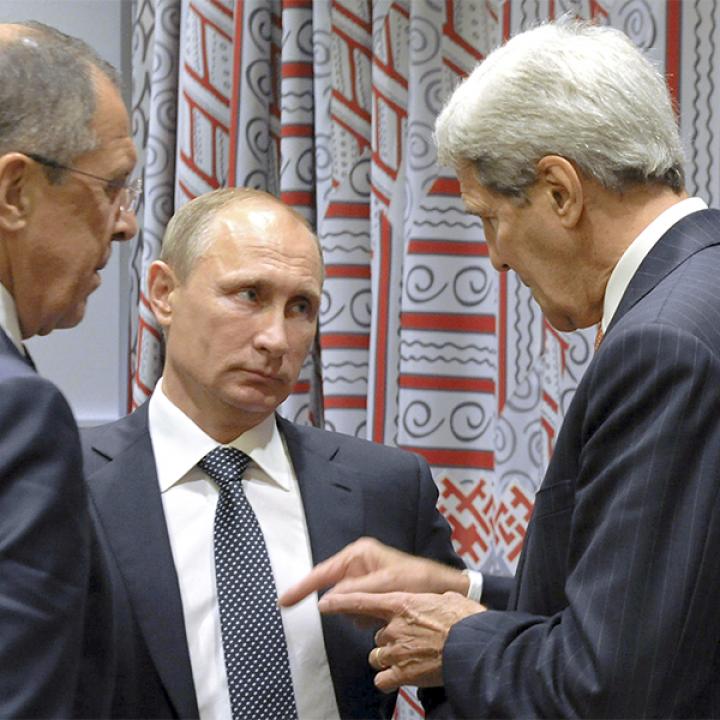
- Policy Analysis
- Policy Alert
New Syria Talks Highlight Russian Ascendance, U.S. Ambivalence

Without stronger American military efforts to hurt ISIS and help the rebels, the Vienna summit has little chance of preventing Moscow from taking the driver's seat in Syria.
This week, President Bashar al-Assad made an unannounced trip to Moscow on the eve of October 23 talks in Vienna between Russian foreign minister Sergei Lavrov, Secretary of State John Kerry, and their Turkish and Saudi counterparts, who are meeting to discuss the Syrian conflict. In his welcoming remarks to Assad, President Vladimir Putin linked Moscow's political and military strategies: "On the question of a settlement in Syria, our position is that positive results in military operations will lay the basis for working out a long-term settlement, based on a political process that involves all political forces, ethnic groups, and religious groups."
Russia's motivations have not changed: in a zero-sum approach to diplomacy, Putin has consistently taken advantage of Western ambivalence on Syria since the uprising began in 2011. The vacuum created by this indecision allowed Putin to insert himself into the peace discussions and advance a self-serving agenda: namely, keeping Assad in power, positioning the Kremlin as an indispensable global player, and distracting the Russian public from domestic problems. After the 2012 and 2014 international peace talks in Geneva failed to produce a resolution, Moscow hosted its own "intra-Syrian" talks in January and April 2015. Those meetings did not advance a true peace settlement either. Rather, they allowed the Kremlin to engage factions that do not demand Assad's departure while reinforcing the notion that he is an indispensable actor in battling "terrorists" -- which Moscow and Damascus define as any armed individual who opposes the regime.
Putin is confident in making such moves because he believes that Western policymakers will not stand by their words, a lesson learned when Washington failed to enforce its redline on chemical weapons use in Syria, welcomed Moscow's 2013 offer to disarm the regime, and tacitly accepted Assad as part of the peace process despite previous statements that he should "step aside." Similarly, since Moscow launched its military intervention last month, Russian forces in Syria have violated Turkish airspace multiple times and reportedly shadowed a U.S. drone without consequence -- Putin tested the West and saw once again that it will reply with little besides angry rhetoric and symbolic moves.
Putin's meeting with Assad this week is a further testament to his confidence that he can force the West to accept his position. According to Russia's TASS News Agency, the parliament's upper house speaker Valentina Matviyenko called on "all interested countries to join the dialogue between Russia and Syria" after the meeting, highlighting Moscow's perceived position as the leader in resolving the crisis.
In this context, the October 23 meeting in Vienna represents a defeat for traditional U.S. policy in the region since 1973, under which America and its allies have borne primary responsibility for countering threats to peace. This defeat is the inexorable result of the Obama administration's reluctance to use necessary military force in Syria -- first in withholding threatened strikes against Assad when he used chemical weapons against his own people, and then in limiting strikes against ISIS despite vowing to "destroy" the group. It simultaneously reflects the emergence of not only a Russian military operational presence in the region, but also a budding Russian alliance with Iran. The only good news is that the Assad regime will not be at the table in Vienna -- though even that is tempered by Assad's surprise trip to Moscow.
In all likelihood, Friday's talks will have one of two outcomes. The first is American and Saudi acquiescence to an "Assad stays for the moment" strategy in order to focus on fighting ISIS. Such an approach would reflect the military steps Russia and Iran are taking in Syria with their allies, as well as continued unwillingness in Washington -- and thus the entire Arab-Turkish anti-Assad coalition -- to challenge Moscow and Tehran. If this scenario comes to pass, the U.S. and Saudi policy of seeking Assad's ouster would be left in shreds, and he would remain in power indefinitely to complete the depopulation of much of his country.
Alternatively, Washington and Riyadh might refuse to formally endorse Assad and play second fiddle to Moscow and Tehran's so-called "anti-ISIS" campaign, yet still offer some flexibility on the timing of Assad's departure. While not as abject a surrender as the first possibility, this position would amount to only temporary face saving unless it were backed by much more aggressive U.S. and Saudi support for those fighting Assad, and a much more effective, rapid U.S.-led military campaign against ISIS. Barring that, Russia and Iran are unlikely to feel any pressure.
In either scenario, it is far from clear whether any ceasefire or transition agreements emerging from the Vienna talks could be implemented on the battlefield. U.S. credibility with armed rebel factions is very low, and their regional backers are unlikely to back off whether Russia is bombing or not. It also remains doubtful that Russia could deliver Assad to anything but a Potemkin political process of the sort that the opposition has already rejected multiple times, even while losing on the battlefield. Therefore, the likeliest scenario is that no matter what happens in Vienna, the war's diplomatic and military tracks will continue to head in two different directions.
Anna Borshchevskaya is the Ira Weiner Fellow at The Washington Institute. James Jeffrey is the Institute's Philip Solondz Distinguished Fellow.




